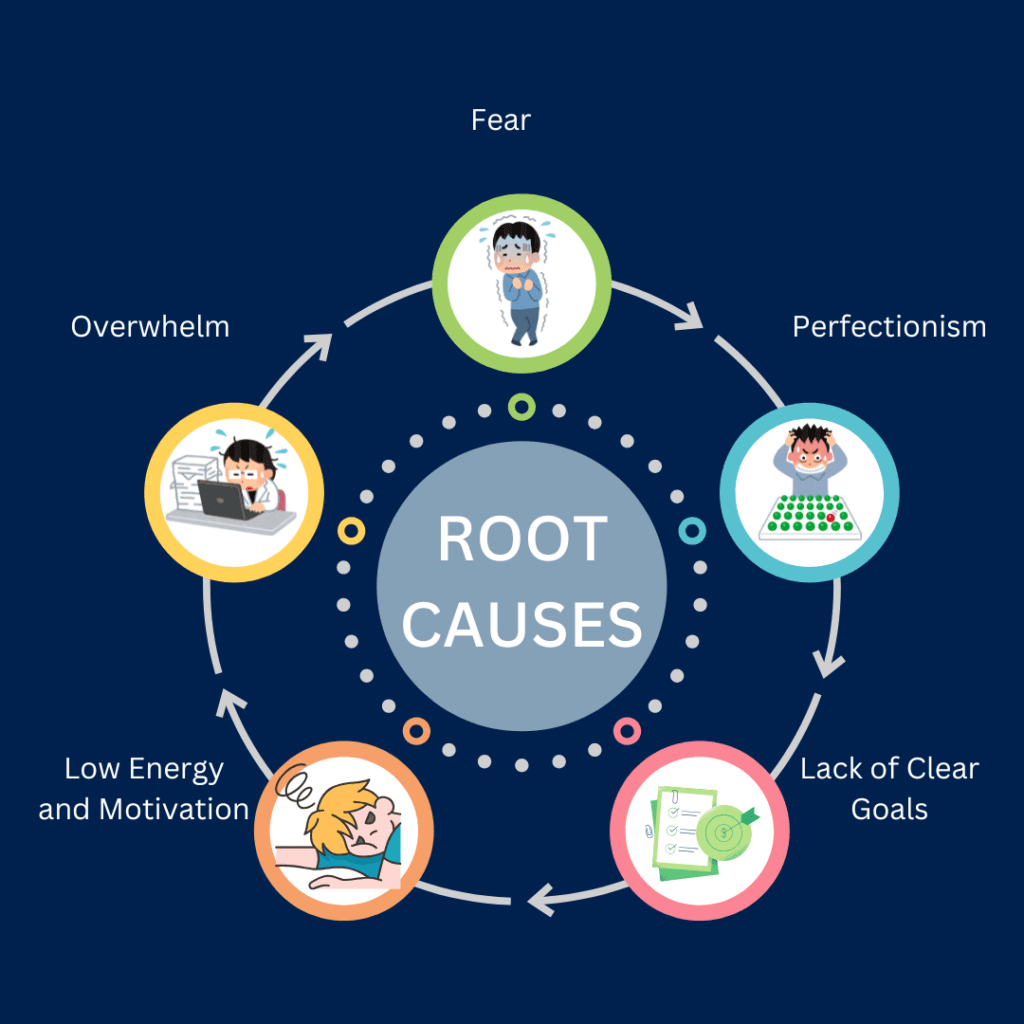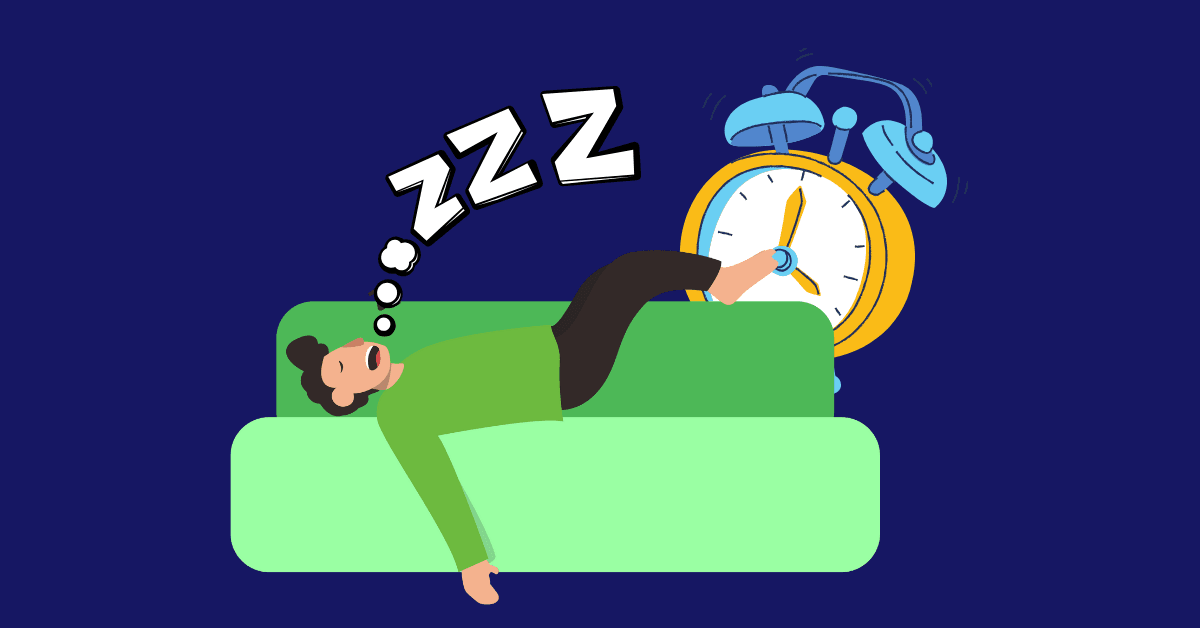We’ve all faced those days where our to-do list seems endless, yet we struggle to make any meaningful progress. Instead of tackling high-priority tasks, we find ourselves drawn to distractions, resulting in a growing sense of stress and frustration. But procrastination isn’t just about poor time management—it’s often linked to feelings of overwhelm, where we’re stuck in our heads rather than listening to our intuition. Studies show that nearly 20% of adults are chronic procrastinators, which can lead to missed opportunities, burnout, and a constant sense of falling behind.
The good news? You can break free from this cycle. In this article, we’ll explore why procrastination and overwhelm occur, the toll they take on your productivity, and practical strategies to overcome them. Let’s dive in!
Root Causes of Procrastination and Overwhelm
Procrastination is often misunderstood as simple laziness. However, it usually stems from deeper psychological factors, especially when we’re overwhelmed by too many tasks or overthinking. Let’s explore some key reasons behind procrastination and how they affect our ability to take action:

1. Fear: The Invisible Barrier to Action
Fear is one of the most common root causes of procrastination. It can take many forms, such as the fear of failing, being judged, or even succeeding. This fear can paralyze you, convincing you that it’s safer to delay starting than to risk making mistakes. For example, when assigned a high-stakes project, self-doubt might cause you to put it off, thinking, “I’ll feel more confident tomorrow.” However, the longer you delay, the harder it becomes to get started.
2. Perfectionism: When “Good Enough” Never Feels Enough
Perfectionism can trap you in an endless cycle of revisions, where nothing feels good enough to finish. This mindset often leads to significant delays, as you keep tweaking and refining in pursuit of an unattainable ideal. It’s like building a sandcastle at the water’s edge—just when you think it’s done, another wave comes in to wash it away. By focusing on progress rather than perfection, you can overcome this barrier and complete tasks more efficiently.
3. Lack of Clear Goals: Navigating Without a Map
When your goals are unclear, it’s challenging to stay focused and motivated. Without a clear direction, it’s easy to get distracted and put off important tasks. Defining specific, actionable goals is crucial for staying on track and avoiding procrastination. Without this clarity, it’s like driving in a new city without a map—you end up wandering aimlessly.
4. Low Energy and Motivation: The Exhaustion Factor
Feeling exhausted can make even simple tasks seem daunting. If you’re burned out, it’s hard to muster the motivation needed to tackle challenging projects. When your energy levels are low, your mind seeks easier distractions, leading to procrastination. Managing your energy through regular breaks and self-care can help you regain focus.
5. Overwhelm: Turning Mountains into Molehills
Big projects can feel like towering mountains, making it difficult to even start. When a task seems too big to handle, it’s easier to delay it. The solution is to break down large projects into smaller, manageable steps. By focusing on one part at a time, you can reduce overwhelm and build momentum.
Proven Techniques to Break Free from Procrastination
Now that we’ve explored the causes, let’s look at effective strategies to overcome procrastination and get back on track.

1. Listen to Your Body
Your body constantly sends signals about its needs. If you’re tired, take a short nap or go for a walk to recharge. Engaging in light physical activities can boost your energy and improve mental clarity. By listening to your body’s cues, you’ll be able to maintain better overall productivity.
2. Be Present and Reflect
In today’s fast-paced world, taking time to disconnect and reflect is essential. Find a quiet space, turn off distractions, and focus on being present. Reflecting on your priorities and progress helps you connect with your intuition, making it easier to align with what truly matters.
3. Create Pattern Interrupts
When you catch yourself overthinking or getting overwhelmed, use a pattern interrupt. This can be as simple as taking a deep breath, doing a quick physical activity, or reminding yourself to stop. Interrupting negative thought cycles helps you reset your focus and regain clarity.
4. Set Boundaries and Prioritize
One of the main reasons for overwhelm is trying to do too much at once. Set clear boundaries around your time and energy. Identify your top priorities and schedule blocks of uninterrupted time for focused work. This structured approach helps prevent burnout and keeps you on track.
5. Engage in Self-Care
Self-care goes beyond rest; it’s about doing activities that rejuvenate you. Whether it’s exercising, meditating, or spending time with loved ones, find what nourishes you. Regular self-care is essential for maintaining balance and productivity.
6. Reflect and Adjust
Procrastination often results from feeling stuck. Regularly reflect on your actions to identify what’s working and what needs adjustment. By making continuous improvements, you’ll stay adaptable and efficient.
7. Seek Support
Sometimes, breaking the cycle of procrastination requires leaning on others. Seek guidance from mentors, coaches, or friends who can provide encouragement and accountability. A supportive network can give you the push you need to take action.
What If You Don’t Address Procrastination?
Ignoring procrastination can have serious consequences beyond missed deadlines. When tasks pile up, it creates a snowball effect of anxiety and stress, leading to chronic burnout. This cycle can erode your self-confidence, making it even harder to tackle future challenges. Over time, it may prevent you from reaching your full potential, both personally and professionally.
Addressing procrastination is about reclaiming your time, energy, and confidence. By applying the strategies discussed, you can transform procrastination into purposeful action, leading to greater success and a more fulfilling life.
Common Myths About Procrastination (And the Truth Behind Them)
Myth 1: Procrastinators Are Lazy
Truth: Procrastination is often driven by fear, self-doubt, or perfectionism, not laziness.
Myth 2: I Do My Best Work Under Pressure
Truth: While deadlines can create a sense of urgency, rushing often results in lower-quality work and more stress.
Myth 3: Procrastination Is Just Poor Time Management
Truth: It’s more about managing emotions than managing time. Boring or overwhelming tasks can trigger avoidance behaviors.
Taking Charge of Your Life: A Final Word
Breaking free from procrastination isn’t about perfection—it’s about making consistent, small changes that lead to lasting results. By setting boundaries, listening to your body, and practicing self-care, you can transform procrastination into purposeful action. Embrace the process, be kind to yourself, and remember that growth is a journey. When you take control, you’ll find not just increased productivity but also greater clarity, fulfillment, and joy in your work and life.
FAQs
How does procrastination affect mental health?
Procrastination can significantly impact mental health by increasing stress, anxiety, and feelings of guilt. When tasks pile up, it leads to a sense of being overwhelmed, which can lower self-esteem and, over time, contribute to chronic conditions like depression or burnout.
Can procrastination be a symptom of ADHD?
Yes, procrastination is commonly linked to ADHD due to difficulties with focus, time management, and self-regulation. Those with ADHD may find it harder to start or stay on tasks, especially if they are uninteresting or lack immediate rewards. Using structured approaches and ADHD-specific strategies can help manage procrastination.
What are some quick ways to stop procrastinating?
To quickly overcome procrastination, try using the 2-Minute Rule: commit to working on a task for just two minutes to build momentum. Additionally, break down large projects into smaller, manageable steps, use the Pomodoro Technique (25 minutes of focused work followed by a short break), or set specific deadlines to stay on track.
Does perfectionism lead to procrastination?
Yes, perfectionism is a common cause of procrastination. People who strive for perfection may delay starting or completing tasks out of fear that their work won’t meet their high standards. Shifting the focus from perfection to progress can help overcome this barrier, allowing tasks to be completed more efficiently.
How long does it take to stop procrastinating?
Overcoming procrastination is about building new habits, which can take anywhere from 21 to 66 days, depending on the individual. Consistently applying techniques like setting clear goals, using time-management strategies, and celebrating small wins can gradually transform procrastination into productive behavior.





